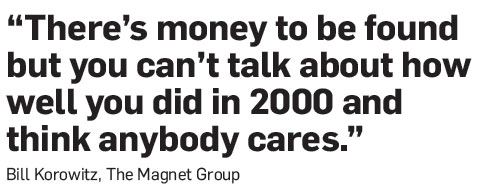December 05, 2016
Raising Capital in the Promotional Products Industry
Industry veterans Vera Muzzillo and Bill Korowitz discuss the current state of lending in this exclusive Counselor interview.
One’s a clear-eyed finance pro helping to guide one of the industry’s biggest distributors. The other’s a trained economist who started a private equity group last year. Suffice to say, Vera Muzzillo and Bill Korowitz know a thing or two about money.

Counselor: What’s the current state of lending and the different avenues to capital in this industry?
Vera Muzzillo: In terms of access to both capital and borrowing, the industry is in a pretty stable place right now. Larger distributors and suppliers certainly have access to the lending markets through the commercial banks. We’ve also seen private equity come in on specific scenarios from some of the larger distributors and suppliers. From a smaller distributor perspective, there are still traditional lending avenues as well as SBA in certain cases. I think we’ve been through an influx of money particularly at the larger level from some of the third-party investment firms.
Bill Korowitz: Vera’s right and I would add that there’s money in the world to be invested because there’s not a very good place to put money today. I think they’re looking for good businesses that have sound balance sheets and management teams to invest in. There’s money to be found, but you can’t talk about how well you did in 2000 and think anybody cares, because they don’t. They want to know about today.
Counselor: Vera, I wanted to circle back to something you said about the influx of money that you see coming in. Why do you think that’s the case?
VM: The industry does offer for outside investors some attractive metrics. For example, our industry historically has been fairly strong in terms of credit risk. Bad debt experience in this industry overall is low. So that appeals to people, and another thing that appeals particularly to banks is that the portfolio is pretty diverse. Many of the large suppliers and distributors in the industry don’t rely heavily on a small number of customers and as a result of that, outside financial investors find that to be extremely attractive because it really mitigates the risk of the industry itself.

Counselor: Bill, you started a private equity company last year that was geared toward the industry. What were your reasons for doing that? And is it based in the current financial landscape?
BK: There are probably two or three types of companies that are out there today. There are certain growth companies. There’s a group that go to work and have a couple customers and are happy as clams. Then there are the companies who have been in the industry for a long time, but their owners have no exit strategy. They never really thought about it, which is strange because they’re in their 60s and 70s. Their kids don’t want the business; what should they do next? I guess we’re perfect for that kind. The amount of companies that are available for us to talk to exceeds how many people we have that can do the talking.
VM: I completely agree with Bill’s assessment on this. We at Proforma and our owners have a very robust M&A platform, and we’re doing tens of millions of dollars in mergers and acquisitions every year based on exactly what Bill’s talking about, which is that the industry is fairly mature. There are quite a few distributors out there that need an exit strategy and a lot of times they haven’t even started to realize that they need it, so it’s all about being in the right place at the right time to have that discussion.
Counselor: Is there anything that could threaten the stability of available financing?
VM: This industry, to me, is a leading indicator – companies shut down their promotional budget before they shut down other pieces of their operation engine. So I think if the economy takes a turn for the worse, you’re going to see the promotional products industry take a hit. And once it takes the hit, then bank support tends to be stricter, especially with industries that experience deeper declines in profitability or sales.
BK: I hate to keep agreeing, but I agree with Vera. Plus she’s smarter than me. With the election, who knows six months from today what the climate is going to be like. I agree with Vera that our industry gets affected first. We were the people who knew the recession was coming in 2008, 2009 before it hit the country. Will interest rates have an effect on how much money is available for us? I don’t know. It’s a very good question. People may want to wait on the sidelines and see what happens in 2017.